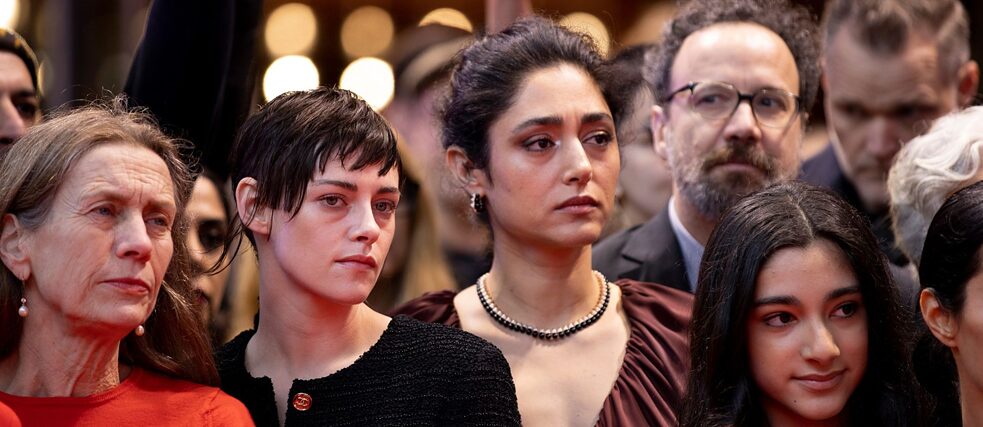Solidarity
Berlinale trains its spotlight on Ukraine and Iran

Between hard-hitting documentaries, investigative exposé and nostalgic retelling of historical events, Berlinale 73 stands in solidarity with Ukraine and Iran.
The Berlinale red carpet briefly morphed into a site of protest when Iranian talent present at the festival joined hands with the festival organizers to protest the regime. Carrying signs and chanting the call of “Women, Life, Freedom,” the protesters were joined by festival’s executive director Mariette Risenbeek, artistic director Carlo Chatrian, jury president Kristen Stewart and jury member Golshifteh Farahani. Providing platform for visible protests notwithstanding, Berlinale has also generously sprinkled its festival line-up with films and documentaries from both Ukraine and Iran to highlight the war and the revolution currently underway in both countries.
Hollywood star wants in on the Ukraine news cycle
Perhaps the biggest star vehicle and the most visible among the offerings is the Sean Penn documentary Superpower about Russia’s war in Ukraine in the Berlinale Special Gala section. Penn’s documentary is in collaboration with Vice which means it’s slick and well produced, even if it puts Penn at the centre of affairs. The charismatic Zelensky is interviewed by Penn a few times in the documentary and the crew travelled to Ukraine just as the war was about to break out, revisiting the country and its now-destroyed cities and frontlines of the war.
While Penn’s documentary is effectively a straightforward retelling of the war in Ukraine, a five-minute-long queer documentary short in the Berlinale Shorts section from Ukraine called It’s a Date by Nadia Parfan set in Kyiv captures the horrors of war, chillingly. Some though are afforded a brief respite from war, like the five teenagers from Donbas who take a Himalayan expedition featured in the Generation section documentary We Will Not Fade Away by director Alisa Kovalenko. A bit of soviet era nostalgia is also in order with Tonia Noyabrova’s Panorama feature Do You Love Me? in which a Ukranian teenager witnesses the fall of soviet union.
Luis Alejandro Yero’s Calls from Moscow in the Forum documentary section takes the viewers through Cuban exiles in Moscow and how Russia’s war on Ukraine threatens their already precarious standing. Roman Liubyi’s Iron Butterflies investigates the shooting down of Malaysian airlines plane over eastern Ukraine in 2014 for Panorama documentary section.
Iran, missing in some areas, visible in others
Iran is absent from this year’s competition section but there are hard hitting documentaries and experimental films from the country. In My Worst Enemy screened in the Encounters section, filmmaker Mehran Tamadon turns himself into an interview subject asking exiled Iranians - who were subject to torture and imprisonment themselves - to interrogate him.
In the Panorama section, Swedish-Iranian director Milad Alami’s Motståndaren (Opponent) is about an Iranian refugee hustling as a wrestler in Sweden to increase his chances of approval of his asylum process. 1980s Iran is the focus of Sepideh Farsi’s The Siren in the aftermath of an Iraqi missile strike on the city of Abadan. Panorama’s documentary section features Sreemoyee Singh’s And, Towards Happy Valleys with interviews from imprisoned artists and directors like Jafar Panahi.
Broken criminal justice system punishes women for atrocities against them
In the Perspektive Deutsches Kino, Steffi Niederzoll’s Seven Winters in Tehran takes a long hard look at the misogynist criminal justice system in Iran that punishes women for rape. The Forum documentary Where God is Not, second work to be featured in the festival by director Mehran Tamadon, interviews former exiled Iranian political prisoners and recreates their imprisonment with bizarre effect. Between Revolutions by Vlad Petri is a semi-fictional account of a correspondence between two women, witness to revolutions in the Shah’s Iran of 1979 and during the period of Ceausescu’s Romania.
Despite all the solidarity for Ukraine shown by Berlinale, Hollywood itself has not shied away from doing business in Russia, Variety magazine reported. According to reliable reports by agencies, Hollywood films dominate Russian box-office and enjoy brisk business - more than a 140 Hollywood releases graced Russian screens last year with this year’s data showing a continuation of the same trend.
Whichever way you look at it, Berlinale has lived up to its reputation by showing solidarity and showcasing politically important work from both Ukraine and Iran.
About the author
Prathap Nair is an independent cultural journalist based in Düsseldorf, Germany, who covers the Berlinale for major Indian publications.
